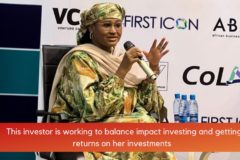Yemisi Isidi moved back to Nigeria from the UK in 2017, and after seeing how difficult it was for businesses, especially women-owned ones, to scale, she decided to do something about it. At first, she started helping small business owners utilise social media to grow their businesses until that seemed inadequate, and then she moved into providing micro-loans through a company she started, Triift Africa. After a while, even that became inadequate as she discovered that beyond finances, entrepreneurs required a lot of structure and good management to thrive, and so she decided to step up to that. Yemisi, who graduated from Aston University in Birmingham with a degree in Accounting and Business Management started to provide advisory services to business owners.
In the last two years, Yemisi Isidi has been involved in the disbursement of over $10 million to early founders and business owners. She has also been invested in providing technical advisory to enterprise programs, as well as mentorship and access through various accelerators and incubation programs like the She Leads Africa program and The Future Female Business School which was set up by the UK-Nigeria Tech Hub to support young female tech founders. Some alumni of these programs include Medsaf, Shuttlers, and Auto Girl.
For Centre Stage, TechCabal had a chat with Yemisi on the role of mentorships in building sustainable businesses.
How would you describe yourself outside of the work that you do?
Yemisi Isidi: I am a very driven and passionate person. I care deeply about seeing things grow, whether it’s a business, idea, or community and this shapes whatever it is that I do. I like to see people live better lives and a lot of times I am grateful that I get to contribute to that through my work.
At an event some weeks ago, you mentioned that you didn’t agree with the narrative of female founders being over-mentored. Please can you speak about that some more?
YI: The popular saying is that female startup founders are over-mentored and underfunded. I agree with the underfunded path and I’ve seen a lot more effort in that regard with programmes intentionally focused on putting money in the hands of female founders, whether startup founders or SME business owners.
But when we say female founders are over-mentored, then I don’t agree. Mentorship covers a lot of things, including operational advice. If you have an investor who gives you money, but isn’t holding you accountable and doesn’t understand your industry enough to give you professional advice or access to a valuable network, then there’s a very high chance of you failing, despite the money and this is applicable to both male and female founders.
Startups that were part of local incubation or accelerator programmes are more likely to succeed, and it’s not just about money but also access to a network and accountability structure that supports their growth. We’ve seen startups that were on the brink of folding but were resuscitated by their local investors. Not just with money, but also with them being able to rally and provide management with the support that they need to pull them through the process.
Underfunded and over-mentored just sounds like “Give me the money and leave me alone to do the work.” But there are bigger questions that need to be answered to build a sustainable business, questions like if they know how to do the work and if they’re always going to be motivated when doing the work. There needs to be additional support beyond funding that makes it easier for people to build profitable and sustainable businesses, and this is a gap that mentorship covers. So yes, women are underfunded, but there is still room for mentorship.
What are some of the benefits of mentorship to early-stage founders that people don’t pay attention to?
YI: There are so many benefits, but I will share two. First, it gives you access to a network community, which makes it easier to get external funding, especially when you’re part of a recognised mentoring programme. But most importantly, it makes it easier to bootstrap to generate internal funding. Perhaps the mistake here is when we think about funding, we’re thinking of another person who is not a customer giving you money, but there’s funding that is your business being profitable and having healthy cash flow, and I’ve seen how these mentorings and training make it possible for businesses to achieve this more quickly.
Another investor spoke to us about startups not necessarily requiring a huge investment to start operations in the early days. What do you think about that?
YI: Businesses do need money for operations, licences, research, etc, depending on what they’re building. Finding investors early makes it possible to focus on building the business rather than trying to look for other streams of income to sustain it, so money is essential in making growth happen faster. However, it is not always straightforward. I think that a lot of money stifles innovation and problem-solving, especially when there is no accountability. Corporate Governance is already a big issue in our ecosystem. Too much money where there is no solid foundation, assured integrity or product market fit can be a problem. Even when you have a clear path to success, we have a very unpredictable market so it’s important to think about how to build sustainably from the beginning.
What are some of your most important wins in the past years?
YI: Over the past two years alone, have been involved in enabling access to over $10 million in funding for early-stage startups and businesses across six African countries. I’ve also worked with about 700 entrepreneurs across Africa to build investment-ready and profitable businesses and aided them in accessing available funding opportunities.
In 2017, I organised the Illorin Digital Summit which had over 1000 people in attendance from different states across the North Central and Western parts of Nigeria. That work has now evolved to become Cirkle Labs which is an innovation hub that has worked directly with over 4000 young people and businesses, improving their digital literacy to get local and international jobs. We also have helped over 3,500 businesses become more efficient through technology and digital literacy.
At Triift Africa, we are currently working with up to 1000 underserved businesses to access our savings platform, a community for peer-to-peer support and collateral-free loan that works for their business model and makes it easier for them to grow. We also launched Start by Triift Africa where we are addressing the unemployment in Nigeria by making it easier for students and recent graduates to start and grow micro businesses.
What are some things you have learned along the way in managing Triift that you wished you had known at the beginning?
YI: Based on my work with Triift Africa and an operator supporting startups across Africa, I have seen the importance of thinking and paying attention to the numbers from day one. It is very easy to get carried away with the passion you feel and the problem you want to solve that you don’t pause and ask yourself how to consistently capture some of the value you create for others to ensure that you are profitable and sustainable. This is also why I am very passionate about financial literacy for entrepreneurs. Thinking about the numbers, how to cut down costs, how to keep a financial record, and how to improve revenue and profit, will help you make better strategic and data-driven decisions.





















